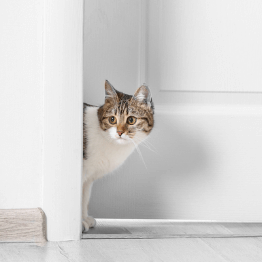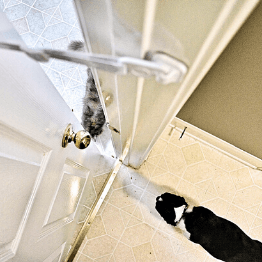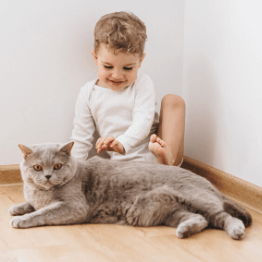HOW TO TELL IF YOUR CAT IS SICK
By: Door Buddy Editors | Published: 29 January, 2024

Cats, known for their mysterious ways, often conceal signs of sickness. As a vigilant cat owner, it's crucial to recognize subtle cues indicating your feline friend may not be at their best. Beyond simply observing these cues, it’s also recommended to schedule a minimum of two veterinary visits per year.
By gaining insight into how cats express symptoms of illness, you'll be adept at identifying early warning signs and have an understanding of the “im-paw-tant” information to convey to your veterinarian. In this blog article, we will explore how to tell if your cat is sick and unveil key signs that your feline furbaby could be under the weather.
SICK CAT BODY LANGUAGE
1. Behavioral Changes
Cats may exhibit changes in behavior when unwell. Watch for alterations in activity levels, playfulness, or sudden aggression. Observe their grooming habits, a decrease in grooming or excessive grooming can signal health issues.
2. Appetite and Water Consumption
Changes in appetite are often indicative of health problems. Monitor your cat's eating habits, and consult a vet if they show disinterest in food. Increased or decreased water consumption may suggest underlying health issues, so keep an eye on their water bowl.
3. Litter Box Habits
Pay attention to your cat's litter box habits. Changes in frequency, difficulty, or the appearance of the stool may be signs that your cat is sick. Inappropriate urination or defecation outside the litter box could also be a red flag.
4. Physical Signs
Regularly check for physical signs like lethargy, weight loss, altered body posture, dilated pupils, getting sick, vomiting, unpleasant breath, concealment, and eye or nasal discharge. Additionally, pay attention to their coat - a lackluster, disheveled appearance could signify underlying health issues.
5. Vocalization Patterns
Unusual vocalizations, such as excessive meowing, hissing, or changes in tone, can be a way your cat communicates discomfort.
6. Breathing and Respiratory Issues
Monitor your cat's breathing patterns. Rapid or labored breathing may indicate respiratory problems. Check for sneezing, coughing, or nasal discharge, which could be signs of an underlying issue.
WHAT TO DO IF YOUR CAT IS SICK

As devoted cat “paw-rents”, it can be distressing to witness our feline friends under the weather. Recognizing the subtle signs of your cat being sick is the first step in providing timely and effective care. The next step is caring for your sick cat at home:
-
Begin by consulting a vet to proactively identify the cause and follow their guidance.
-
Ensure your cat stays well-hydrated to prevent kidney problems by providing plenty of water.
-
Create a cozy spot in a quiet area, consider using a Door Buddy for added privacy.
-
For immobile cats, rotate their position every two hours to prevent discomfort.
-
Alleviate stress by grooming your cat and making sure you know how to groom your cat.
-
Vigilantly monitor your cat's well-being and keep a record of their health status.
CONCLUSION: HOW TO TELL IF YOUR CAT IS SICK
Being attuned to your cat's behavior and health is a vital aspect of responsible “paw-rent”. By looking out for signs that your cat is sick, you can proactively address your cat's health needs and figure out when your cat is sick.
If you notice any concerning changes, consult with your veterinarian promptly for proper diagnosis and treatment. Your cat's well-being is in your hands – be their health advocate!




